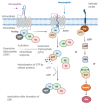Food-Derived Opioid Peptides in Human Health: A Review
- PMID: 33233481
- PMCID: PMC7700510
- DOI: 10.3390/ijms21228825
Food-Derived Opioid Peptides in Human Health: A Review
Abstract
World Health Organization data suggest that stress, depression, and anxiety have a noticeable prevalence and are becoming some of the most common causes of disability in the Western world. Stress-related disorders are considered to be a challenge for the healthcare system with their great economic and social impact. The knowledge on these conditions is not very clear among many people, as a high proportion of patients do not respond to the currently available medications for targeting the monoaminergic system. In addition, the use of clinical drugs is also associated with various side effects such as vomiting, dizziness, sedation, nausea, constipation, and many more, which prevents their effective use. Therefore, opioid peptides derived from food sources are becoming one of the safe and natural alternatives because of their production from natural sources such as animals and plant proteins. The requirement for screening and considering dietary proteins as a source of bioactive peptides is highlighted to understand their potential roles in stress-related disorders as a part of a diet or as a drug complementing therapeutic prescription. In this review, we discussed current knowledge on opioid endogenous and exogenous peptides concentrating on their production, purification, and related studies. To fully understand their potential in stress-related conditions, either as a drug or as a therapeutic part of a diet prescription, the need to screen more dietary proteins as a source of novel opioid peptides is emphasized.
Keywords: bioactive peptides; endogenous and exogenous opioid peptides; human health; stress.
Conflict of interest statement
The authors declare no conflict of interest. The funders had no role in the design of the study; in the collection, analyses, or interpretation of data; in the writing of the manuscript, or in the decision to publish the results.
Figures





References
-
- World Health Organization World Mental Health Day, 10 October 2012. [(accessed on 30 September 2020)]; Available online: http://www.who.int/mental_health/management.
-
- Substance Abuse and Mental Health Services Administration . Mental Health Services Administration. Key Substance Use and Mental Health Indicators in the United States: Results from the 2016 National Survey on Drug Use and Health (HHS Publication No. SMA 17-5044, NSDUH Series H-52) Center for Behavioral Health Statistics and Quality; Rockville, MD, USA: 2017.
Publication types
MeSH terms
Substances
Grants and funding
LinkOut - more resources
Full Text Sources
Medical

